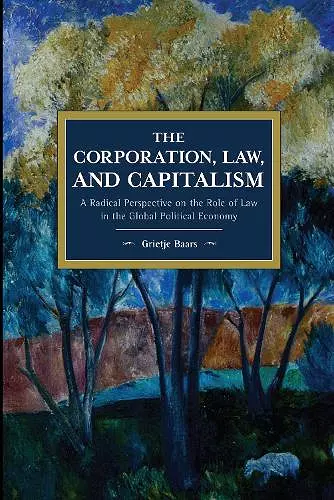The Corporation, Law, and Capitalism
A Radical Perspective on the Role of Law in the Global Political Economy
Format:Paperback
Publisher:Haymarket Books
Published:16th Jun '20
Currently unavailable, and unfortunately no date known when it will be back

In The Corporation, Law and Capitalism, Grietje Baars offers a radical Marxist perspective on the role of law in the global political economy. Closing a major gap in historical-materialist scholarship, Baars demonstrates how the corporation, capitalism 's main engine from city-state and colonial times to the present multinational, is a masterpiece of legal technology. The symbiosis between law and capital becomes acutely apparent in the question of 'corporate accountability '. Baars provides a detailed analysis of corporate human rights and war crimes trials, from the Nuremberg industrialists ' trials to current efforts. The book shows that precisely because of law 's relationship to capital, law cannot prevent or remedy the 'externalities ' produced by corporate capitalism. This realisation will generate the space required to formulate a different answer to 'the question of the corporation ', and to global corporate capitalism more broadly, outside of the law.
"A brilliant and compelling critique, Baars rigorously reveals law's intrinsic links to capitalism, and how that accounts for its chronic failure to protect people and planet from corporate impunity and destruction. Elegantly written and persuasively argued, Baars' conclusions are as thoughtful as they are radical."
—Joel Bakan,Professor of Law at the University of British Columbia
"Grietje Baars' book, The Corporation, Law and Capitalism, explodes off the page in prose crackling with political energy. Marxist analysis of law is here renewed to target the corporate form, and the legal architectures of immunity and entrenchment that have come to surround it. International criminal law in particular—the 'accountability tool of choice' for so many—is subjected here to an exacting, revelatory re-read. Efforts to hold corporate leaders to criminal account after World War II turn out, perversely, to have unrolled a 'process of exoneration' the repertoire of which continues to ensure law's 'capitalising mission'. Reformist labour too often creates 'value for capitalism', Baars shows. Yet Baars rummage still for the 'seed of the new' in the contradictions of the current situation. This book is both devastating and energizing. Read it, now"
—Fleur Johns, Professor of Law at UNSW Sydney
"The corporation represents the central institution of modern capitalism, yet it is one to which Marxists have paid little attention. Grietje Baars rectifies this situation, offering a systematic Marxist reconstruction of the legal form of the corporation from its origins through to the present day. The book is essential reading to anyone interested in the corporation, Marxist analysis of the law and how to fight contemporary capitalism."
—Robert Knox, Senior Lecturer (University of Liverpool), Historical Materialism Editorial Board
"Important, groundbreaking, meticulously researched and provocative, The Corporation, Law and Capitalism delivers a radical critique of corporate capitalism. A must read for legal scholars and organization theorists."
—Bobby Banerjee, Professor of Management, Cass Business School, London, UK
"This immensely ambitious work examines the past and current uses of international law as an instrument to uphold the irresponsibility of corporate actors for global injustices. From the operations of the early trading companies, the atrocities of the King Leopold's Congo and the trials of the industrialists at Nuremberg, Baars takes us to present-day investment arbitration and international criminal law. She shows us how legal texts and interpretations of jurists over again shield business practices from public accountability. This is not simply a failure of legal institutions or individual jurists, she argues. These institutions and juridical techniques have been positively designed to facilitate corporate governance of the world. Even when they might be used to address obvious problems of global inequality, they are not so used.
This is an erudite and powerful work that will hopefully open the way for further studies on the role of international law in reproducing the conditions of a terribly unjust world."
—Martti Koskenniemi, Professor of International Law (Helsinki)
"Quite phenomenal in its scope and originality, this book offers a hugely important argument against the false promise of legal emancipation, arguing instead for a truly human emancipation from corporate rule."
—David Whyte, Professor of Socio-legal Studies, University of Liverpool
ISBN: 9781642591873
Dimensions: unknown
Weight: unknown
498 pages